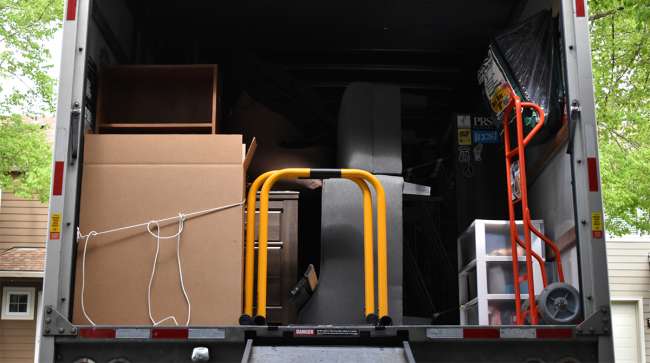Senior Reporter
House Lawmakers Introduce Moving Protection Bill

[Stay on top of transportation news: Get TTNews in your inbox.]
Legislation that aims to increase protections for people moving personal property was recently introduced in the U.S. House of Representatives.
The Household Goods Shipping Consumer Protection Act, introduced by Reps. Eleanor Holmes Norton (D-D.C.) and Mike Ezell (R-Miss.), would enhance programs at the Federal Motor Carrier Safety Administration. Its aim is to help guarantee the safe transport of goods for individuals moving around the country.
“FMCSA receives thousands of complaints every year from Americans who are the victims of fraud in the shipment of household goods by licensed entities,” Norton said May 22. “This bill would provide FMCSA with explicit authority to assess civil penalties for violations of commercial regulations, and crucially, to withhold registration from applicants failing to provide verification details demonstrating they intend to operate legitimate businesses.”
“Americans moving across state lines need to be able to have confidence in FMCSA-licensed companies transporting their physical belongings, and I’m proud to introduce this bill with Rep. Ezell to strengthen protections,” she added. Norton is the ranking Democrat on the Highways and Transit Subcommittee.
In response to fraudulent schemes by illegitimate residential moving companies, @RepEzell and I introduced a bill to strengthen consumer protections and confidence in FMCSA-licensed movers.
Statement: https://t.co/pt2kAGAj9Q — Eleanor #DCStatehood Holmes Norton (@EleanorNorton) May 22, 2024
Ezell, also a member of the Transportation and Infrastructure Committee, emphasized: “Holding these fraudulent actors in the transportation sector accountable will not only protect individuals but also benefit trustworthy companies and their employees. I am glad to co-author this critical initiative to stop fraud and establish greater law and order in our economy.”
Specifically, the legislation would provide FMCSA with certain authority to proceed with civil penalties against unregistered shippers. It also would target entities found to have held consumers’ goods hostage. The agency also would be authorized to establish certain requirements that would ensure motor carriers, brokers and freight forwarders are operating legitimately.
The bipartisan bill was referred to a committee of jurisdiction. Its consideration has yet to be scheduled for a vote. A Senate version also awaits consideration.
It’s peak moving season. Prepare before you move by knowing the difference between a mover and broker: Mover - owns trucks/ has staff that handles your move directly. Broker - arranges the transportation of your goods.
Learn more https://t.co/Gj28ILnuem. pic.twitter.com/bWD8DirPTm — FMCSA (@FMCSA) May 28, 2024
“Fraudulent activities not only cause significant financial losses but also undermine public trust in institutions and markets,” said Anne Reinke, president and CEO of the Transportation Intermediaries Association. “By implementing strong anti-fraud laws, governments can ensure a more stable and predictable economic environment, which is essential for sustainable growth and investment. This legislation achieves these goals by implementing several key provisions to reinforce the federal government’s role in combating fraud.”
American Trucking Associations also has previously endorsed the bill.
Last month, FMCSA launched “Operation Protect Your Move.” The nationwide campaign is designed to expose fraud in the transport of interstate household goods. It also monitors household goods moving companies and promotes consumer protection regulations and statutes.
Want more news? Listen to today's daily briefing above or go here for more info
“Americans deserve a fair deal when they move into a new home — and we’re cracking down on moving companies that hold people’s possessions hostage,” Transportation Secretary Pete Buttigieg said May 20.
“This initiative will build on last year’s progress holding scammers accountable and is another example of the measures the Biden administration is taking to better protect consumers,” the secretary continued.
“We take our consumer protection role seriously and aim to help educate and protect those who may be moving their household goods from one state to another,” added FMCSA Acting Deputy Administrator Sue Lawless. “We are committed to this work, and we are putting forth even more resources to make a greater impact, including increasing the number of [household goods] investigators on staff and establishing additional partnerships with state attorneys general offices.”




